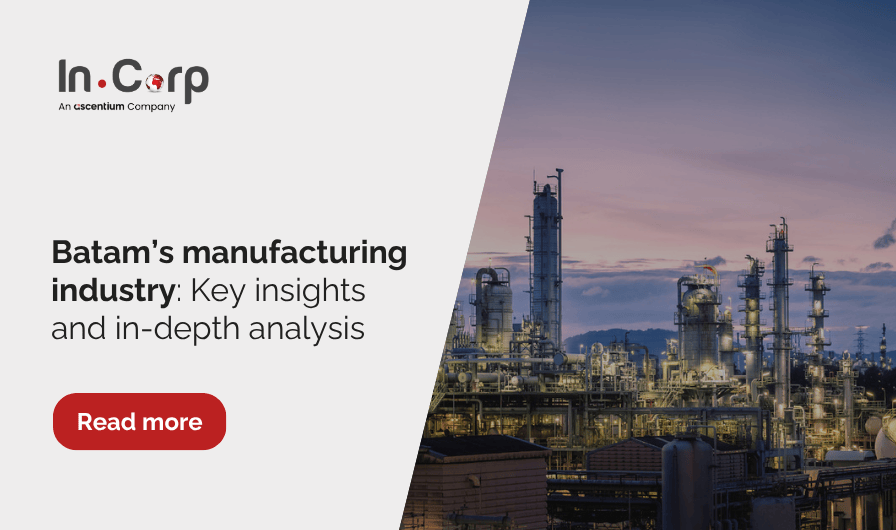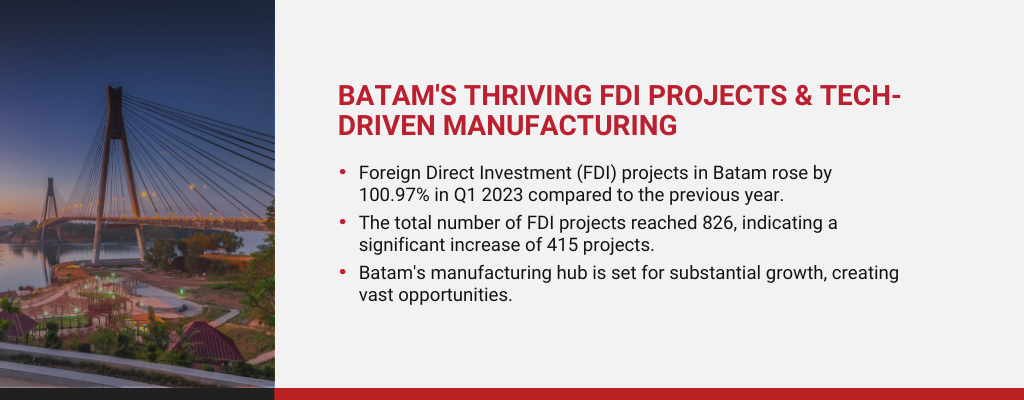As the manufacturing industry takes center stage and continues to experience exponential growth, Batam emerges as an increasingly thriving and dynamic hub. With that in mind, Batam presents many promising business prospects for local entrepreneurs and global investors.
This article will highlight the essential steps businesses can take to establish a strong foothold and capitalize on the vast opportunities Batam’s booming manufacturing industry offers. By following these essential guidelines, entrepreneurs and investors can confidently navigate the landscape and ensure success in the thriving business ecosystem of Batam.
What is the manufacturing industry
The manufacturing industry is associated with the production of goods, transforming raw materials or semi-finished materials into finished products through the use of machines, manpower, and structured production processes. Manufacturing enhances the value of raw materials or semi-finished goods. Economic theories also suggest that large-scale manufacturing improves production efficiency.
The global manufacturing industry of goods has undergone significant changes over time. Production now focuses not only on the final product but also on the effectiveness and efficiency of manufacturing. Hence, the type of manufacturing used in product creation has to be precise. Here are a few types of manufacturing:
1. Additive manufacturing
Commonly known as 3D printing, this type of manufacturing constructs a three-dimensional object from a digital 3D model or CAD model. The product shapes and patterns are typically created layer by layer under computer control.
2. Advanced manufacturing
This type applies new technologies to improve the production process. Advanced manufacturing helps businesses produce their products in mass quantities and in the shortest time possible.
3. Contract manufacturing
Involving a third party, businesses create partnerships and relationships with other entities to outsource the manufacturing process.
4. Repetitive manufacturing
Suitable for repeat production at a committed production rate, this type allows the line production of one product over an extended period. Fewer setups make this type more controllable to match demand.
5. Discrete manufacturing
Involving the assembly or production of individual units, this type allows greater diversity and frequent changeovers compared to repetitive manufacturing. While businesses can produce many varieties of products with this type, it may lead to longer production times due to additional setups.
Types of manufacturing techniques
There are three types of manufacturing techniques in the production cycle: Make to Stock, Make to Order, and Make to Assemble.
1. Make to stock
This technique relies on the forecast of product demand. The quantity of production is determined based on the forecasted market demand. While this technique is predicted, if the actual market demand does not meet expectations, it can result in wasted products or increased inventory costs.
2. Make to order
Make to order manufacturing is characterized by direct collaboration with customers to tailor products to their specific needs and specifications. While Make to Order allows for premium pricing and avoids unnecessary inventory, its potential downside lies in the variability of product demand, leading to occasional periods of slower business.
3. Make to assemble
Make to assemble involves initiating production on parts ahead of orders and assembling them upon demand. This technique accelerates delivery times compared to the Make to Order technique and helps mitigate the risk of excess inventory if forecasted demand is not accurate.
How big is the manufacturing capability of Indonesia?
The manufacturing industry in Indonesia has witnessed robust growth in recent years, evident from consecutive annual increases reported in the Indonesia Manufacturing Industry Statistics by BPS (Badan Pusat Statistic). In 2021, the industry recorded a notable growth rate of 3.39%, followed by an even more substantial increase of 4.89% in 2022. This upward trend underscores the dynamic and expanding nature of Indonesia’s manufacturing sector, reflecting positive economic developments and a thriving industrial landscape.
What is the manufacturing capability in Indonesia?
For the year 2024, the Ministry of Industry has set an ambitious target for the gross domestic product (GDP) growth in the manufacturing industry at a rate of 5.8%. Further breaking down the objectives, specific growth targets have been outlined for key industrial subsectors:
- Agro-Industry: 6.14%
- Chemical, Pharmaceutical, and Textile Industry: 4.76%
- Metal, Machinery, Transportation Equipment, and Electronics Industry: 6.87%
- Small, Medium, Miscellaneous Industry: 4.25%
Potential manufacturing hub in Batam
Batam is famous for its immense potential as an industrial zone. The region has greatly emphasized the manufacturing industry as a key driver of its economic growth. Batam’s development facilitates various manufacturing sectors, including electronics, medical equipment, shipbuilding, and software development.
As the city surges forward, businesses are presented with unparalleled opportunities. The growth attracts investors to participate in its transformative journey and leverage the vast potential of Batam’s bustling manufacturing industry.
Read more: How Kendal Industrial Park attracts investors
Batam’s manufacturing industry development
Based on data from the Batam Indonesia Free Zone Authority (BP Batam), the number of Foreign Direct Investment (FDI) projects in Batam increased by 100.97% in the first quarter of 2023. The total number of FDI projects reached 826, indicating a significant rise of 415 projects compared to the same period in 2022.
With Batam’s manufacturing hub poised for immense growth, it has become crucial for businesses to actively participate in establishing manufacturers that embrace advanced technology. Several aspects to be considered are:
1. Strategic locations
Batam’s strategic location along the international shipping route of the Malacca Strait is a key factor that attracts global investors. Given the circumstances, this provides businesses with an opportunity to be a global supplier of certain products.
2. Free trade zones
Implementing Free Trade Zone (FTZ) policies has attracted the interest of manufacturing and other industries to establish a presence in Batam. This attraction is primarily driven by the numerous advantages offered, including favorable customs, excise, and labor regulations, making Batam an ideal destination for businesses seeking to leverage these benefits.
3. A data center hub
Batam has also become a hub for the development of data centers. Currently, investments in the data center sector are increasing, with the Indonesian government establishing a tier 4 data center in the Nongsa Digital Park (NDP) area. NDP is a special economic zone (SEZ) in Batam developed for the animated film industry.
4. Boosting operational efficiency
Establishing a manufacturer in Batam that utilizes adequate technology can streamline business operations, resulting in cost reductions, better quality control, and improved efficiency.
5. Research and development sectors opportunities
With multiple sectors in Batam, businesses can engage in collaborative research and development endeavors, leveraging the existing expertise within the region.
By utilizing technological advancement, businesses can leverage software platforms and specialized tools that enable organizations to effectively apply their skills and knowledge in developing innovative products, techniques, and methods of service delivery.
6. Optimizing business process
Businesses gain access to various tools that can be utilized to streamline production processes. Therefore, Setting up a manufacturer that harnesses adequate technology will enhance overall operational efficiency.
For instance, adopting robotic process automation (RPA) and artificial intelligence-driven systems can enhance productivity, ensure better quality control, and relieve employees from mundane and time-consuming tasks.
Read more: 10 industrial parks to start business in East Java
How to develop your manufacturing industry in Batam
Developing the manufacturing industry can entail several processes, amongst others, including:
1. Data-based business decision
Businesses should rely significantly on accurate and trustworthy data when making critical business decisions.
It enables them to gain insights into the current status of business growth, identify challenges, and capitalize on opportunities.
2. Establish a resilient supply chain
A robust supply chain is important for businesses to navigate unforeseen challenges effectively.
A well-designed supply chain ensures the smooth flow of goods and services from their source to the end consumers, encompassing every step, from procurement to production, distribution, and delivery.
3. Stronger relationships with suppliers
Utilize forecasting methods to plan and cultivate stronger partnerships with your suppliers proactively.
Implementing practical approaches such as prompt bill payments and providing ample order lead time can further nurture robust supplier relationships.
4. Use the lean manufacturing method
Lean manufacturing is a systematic approach that aims to minimize waste and maximize productivity within manufacturing systems.
Embracing lean principles can yield advantages, such as shorter lead times, lower operating expenses, and enhanced product quality.
Read more: Policies and Prospects in Social Economic Zones in Indonesia
5. Enhance productivity
By fostering a positive workplace culture and prioritizing employee experience, businesses will boost productivity and enhance the capability to attract and retain talented staff.
6. Implement ERP technology
Enterprise Resource Planning (ERP) is a comprehensive business management platform that integrates essential functions within a company.
Instead of using multiple disjointed systems, manufacturing companies can adopt ERP solutions to overcome challenges related to information alignment, data accuracy, and communication errors.
Conclusion
To conclude, considering several aspects, such as the strategic location of Batam, its immense potential to be a manufacturing hub, and the availability of supporting policy instruments, Batam has become one of the best choices to start the manufacturing industry.
Businesses can capitalize on the opportunity by seeking assistance from InCorp Indonesia. With its extensive experience in company registration and business license services, InCorp Indonesia can assist your business in maximizing opportunity by establishing your manufacturing facility in one of the promising regions in Indonesia.
Contact our experts to develop your manufacturing industry in Batam by clicking on the button below.
Get in touch with us.
What you'll get
A prompt response to your inquiry
Knowledge for doing business from local experts
Ongoing support for your business
Disclaimer
The information is provided by PT. Cekindo Business International (“InCorp Indonesia/ we”) for general purpose only and we make no representations or warranties of any kind.
We do not act as an authorized government or non-government provider for official documents and services, which is issued by the Government of the Republic of Indonesia or its appointed officials. We do not promote any official government document or services of the Government of the Republic of Indonesia, including but not limited to, business identifiers, health and welfare assistance programs and benefits, unclaimed tax rebate, electronic travel visa and authorization, passports in this website.




